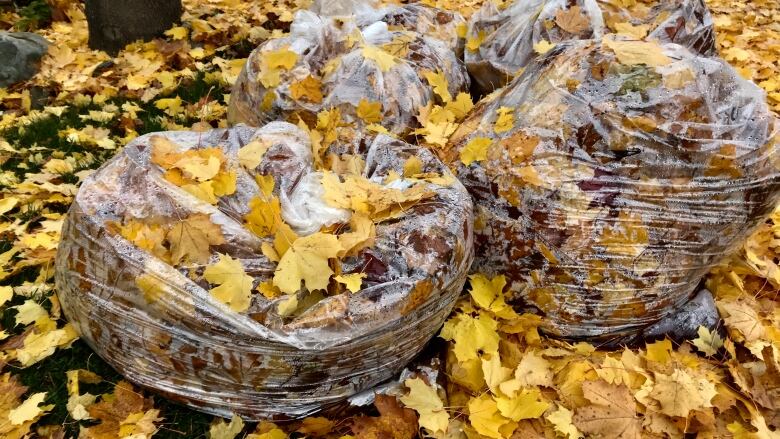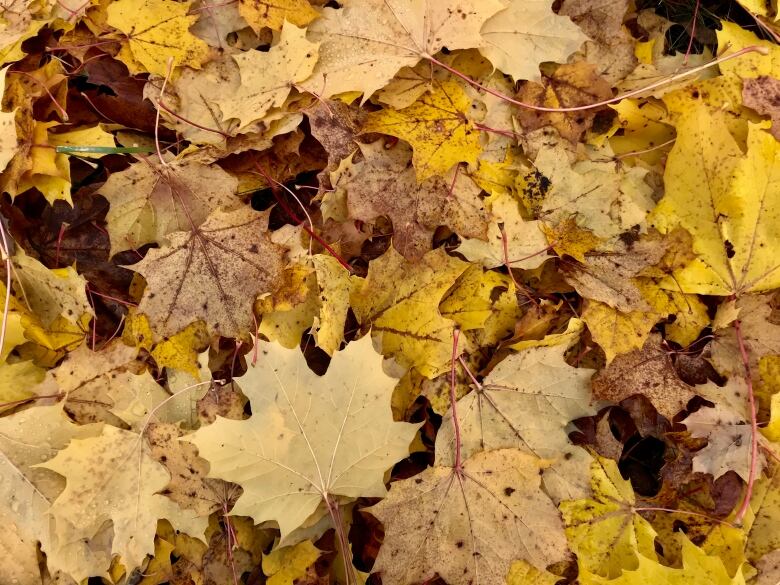Is it better to have raked and bagged, or never to have raked at all?
Letting dead leaves lie is good, or bad, depending on who you ask

It's a headache homeowners haveto deal with every autumn: raking up the dead remains of your deciduous trees.
If that's not your ideal way to spend a Saturday, a Canadian environmental group is recommending letting your leaves lie where they fall.
"The small act of leaving the leaves on the ground over winter can have a positive impact on native pollinators and other wildlife in our backyards," said Andrew Holland, media relations directorof the Nature Conservancy of Canada.
"Animals rely on these fallen leaves for temporary habitat over the winter."

Holland said various species of frogs, toads and insects can take advantage of leaves' insulating effect, and bugs that do make it through the winter become a great source of nutrition for hungry birds come spring.
For the particularlyyardwork-adverse, Holland recommendedleaving entire gardens to overwinter intact.
"Fruits and seeds that remain on the shrubs, and the flowers these are a food source for many different songbirds," he told CBCRadio's The St. John's Morning Show.
Not so fast: horticulturalist
However, one lawn expert said leaving grass and leaves alone to co-mingle doesn't make much sense.
"We're dealing with an ornamental, artificial environment that we've created on our own properties. It's not a wetland, it's not a forest," said Dave Morrow, a horticulturalist in Grand Falls-Windsor.
"It's just an ornamental plant property on our land. So youhave to look at that, and what its needs are."

Morrow agreed that leaves left in yards provide shelter for a variety of life forms. But unfortunately, he said, many of those organisms, from chinch bugs to bacterial diseases,are unwanted fora lawn environment.
But that doesn't mean Morrow is a fan of a pristine swath of Kentucky bluegrass either. He pointed to the virtues of having a lawn where grasses and weeds mix, which he said provides a diversity of habitat for subsoil insects and pollinators alike.
"Just allow the weeds to grow. You can still mow it, it's still green, it looks attractive," he said.
"Rather than not raking leaves in the fall of the year, Ithink you should look more at trying to create a better environment for the insects and the other creatures that mightlive in the soil and feed off the flowers."
The myth of mulch?
A common gardening tip to deal with leaves without resorting to rakes is to use a lawnmower to mulch the leaves, and thenleave that refuse atop lawns or scatter it in garden beds.
But Morrow cautioned against that too.
"It may or may not work. Ittakes time for this stuff to break down," he said.
"By leaving uncomposted foliage on top of your lawn, you're still stifling the lawn."
At least it has people thinking about it, and thinking about nature.- Andrew Holland
He advisedusing a bag attachment while mowing leaves, and then dumping those leaves into a compost pile and letting it overwinter and then, in spring, using that composted product as a soil top dressing.
Both Morrow and Holland agreed it's ultimately up to the individual homeowners, and the specific conditions of their yards, as to whether to partake in an autumn clean up or not. While Holland's anti-raking arguments may fly in the face of horticulture, but he said the debate still serves a purpose no matter which call you make.
"At least it has people thinking about it, and thinking about nature," he said.
With files from The St. John's Morning Show












_(720p).jpg)


 OFFICIAL HD MUSIC VIDEO.jpg)
.jpg)



























































































